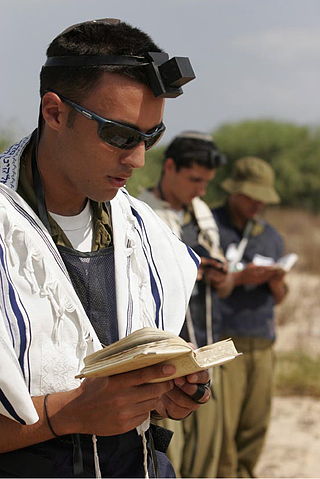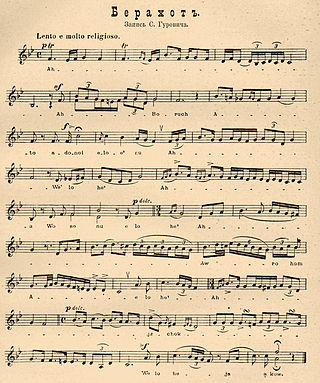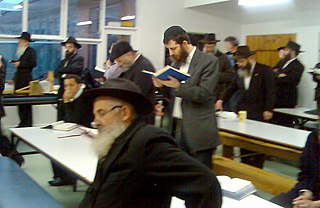Related Research Articles

Jewish prayer is the prayer recitation that forms part of the observance of Rabbinic Judaism. These prayers, often with instructions and commentary, are found in the Siddur, the traditional Jewish prayer book.

Yom Kippur is the holiest day in Judaism and Samaritanism. It occurs annually on the 10th of Tishrei, corresponding to a date in September or early October.

The Amidah, also called the Shemoneh Esreh, is the central prayer of the Jewish liturgy. Observant Jews recite the Amidah at each of three daily prayer services in a typical weekday: morning (Shacharit), afternoon (Mincha), and evening (Ma'ariv). On Shabbat, Rosh Chodesh, and Jewish festivals, a fourth Amidah (Mussaf) is recited after the morning Torah reading, and once per year a fifth Amidah (Ne'ilah) is recited, around sunset on Yom Kippur. Due to the importance of the Amidah, in rabbinic literature it is simply called "hatefila". According to legend, the prayer was composed by the rabbis of the Anshei Knesset HaGedolah. Accordingly, in Judaism, to recite the Amidah is a mitzvah de-rabbanan, i.e., a commandment of rabbinic origin.

Havdalah is a Jewish religious ceremony that marks the symbolic end of Shabbat and ushers in the new week. The ritual involves lighting a special candle with several wicks, blessing a cup of wine, and smelling sweet spices. Shabbat ends on Saturday night after the appearance of three stars in the sky. Havdalah may be performed as late as sunset of the Tuesday following Shabbat.
Tenth of Tevet, the tenth day of the Hebrew month of Tevet, is a fast day in Judaism. It is one of the minor fasts observed from before dawn to nightfall. The fasting is in mourning of the siege of Jerusalem by Nebuchadnezzar II of Babylonia—an event that began on that date and ultimately culminated in the destruction of Solomon's Temple, downfall of the Kingdom of Judah, and the Babylonian exile of the Jewish people.

Kiddush, literally, "sanctification", is a blessing recited over wine or grape juice to sanctify the Shabbat and Jewish holidays. Additionally, the word refers to a small repast held on Shabbat or festival mornings after the prayer services and before the meal.

In Judaism, Rosh Chodesh or Rosh Hodesh is a minor holiday observed at the beginning of every month in the Hebrew calendar, marked by the birth of a new moon. Rosh Chodesh is observed for either one or two days, depending on whether the previous month contained 29 or 30 days.

Shacharit, or Shacharis in Ashkenazi Hebrew, is the morning tefillah (prayer) of Judaism, one of the three daily prayers.

Mincha is the afternoon prayer service in Judaism.

In Judaism, the Ten Days of Repentance are the first ten days of the Hebrew month of Tishrei, beginning with the Jewish New Year Rosh Hashanah and ending with the conclusion of Yom Kippur. These days usually fall in September and/or early October.
Mussaf is an additional service that is recited on Shabbat, Yom Tov, Chol Hamoed, and Rosh Chodesh. The service, which is traditionally combined with the Shacharit in synagogues, is considered to be additional to the regular services of Shacharit, Mincha, and Maariv. In contemporary Hebrew, the word may also signify a newspaper supplement.

Berakhot is the first tractate of Seder Zeraim of the Mishnah and of the Talmud. The tractate discusses the rules of prayers, particularly the Shema and the Amidah, and blessings for various circumstances.
Tachanun or Taḥanun, also called nefilat apayim, is part of Judaism's morning (Shacharit) and afternoon (Mincha) services, after the recitation of the Amidah, the central part of the daily Jewish prayer services. It is also recited at the end of the Selichot service. It is omitted on Shabbat, Jewish holidays and several other occasions. Most traditions recite a longer prayer on Mondays and Thursdays.

Zmanim are specific times of the day mentioned in Jewish law.
Tikkun Chatzot, also spelled Tikkun Chatzos, is a Jewish ritual prayer recited each night after midnight as an expression of mourning and lamentation over the destruction of the Temple in Jerusalem. It is not universally observed, although it is popular among Sephardi and Hasidic Jews.
Pesukei dezimra, or zemirot as they are called in the Spanish and Portuguese tradition, are a group of prayers that may be recited during Shacharit. They consist of various blessings, psalms, and sequences of other Biblical verses. Historically, reciting pesukei dezimra in morning prayer was a practice of only the especially pious. Over the course of Jewish history, their recitation has become widespread custom among all of the various rites of Jewish prayer.
Uva letzion are the first Hebrew words, and colloquially the name, of one of the closing prayers of the morning service. The recitation of this prayer is postponed to Mincha on Shabbat and major Jewish holidays, and in Ashkenazic communities to Ne'ila on Yom Kippur.
Tzidkatcha is a prayer consisting of group of three verses that is recited during the afternoon prayer on Shabbat. It is said in memory of three righteous individuals who died on Shabbat: Joseph, Moses and King David. It is recited at this prayer in particular because these individuals died in the afternoon.

Maariv or Maʿariv, also known as Arvit, or Arbit, is a Jewish prayer service held in the evening or night. It consists primarily of the evening Shema and Amidah.
Yotzer ohr, also known as Birkat yotzer or Birkat Yotzer Or, is the first of the two blessings recited before the Shema during Shacharit, the morning religious services of Judaism.
References
- ↑ On the origins of the Kedushah, see David Flusser, “Sanctus und Gloria,” in Abraham Unser Vater: Juden und Christen im Gespräch Über die Bibel Festschrift für Otto Michael (ed. Otto Betz, Martin Hengel, and Peter Schmidt; Leiden: Brill, 1963), 129-152; repr. in David Flusser, Entdeckungen im Neuen Testament (2 vols.; Neukirchener, 1987-1999), 1:226-244. For an English translation of this article, click here.
- ↑ קווי יסוד להתהוותה של הקדושה וגיבושה.
- ↑ Masekhet Soferim, Chapter 20.
- ↑ Scott-Martin Kosofsky, The Book of Customs, Harper San Francisco, 2004; page 33.
- ↑ The Origin of the Recital of Shema in the Musaf Kedusha
- ↑ Shulchan Aruch, Orach Chaim 59:3
- ↑ Hammer, Rabbi Reuven (2003). Or Chadash: A Commentary on Siddur Sim Shalom for Shabbat and Festivals. New York City: Rabbinical Assembly/United Synagogue of Conservative Judaism. p. 227. ISBN 0-916219-20-8.
- ↑ Tosefta Brachot 1:11
- ↑ Brachot 33a
- ↑ Hekhalot Rabbati 10:5
- ↑ Chullin 91b
- ↑ Tosafot Sanhedrin 37b (s.v. mikanaf) in the name of the geonim
- ↑ Soferim 20:5; Kobetz Hitzei Giborim - Pleitat Sofrim 10 (Nisan 2017), p. 263, text: לפי שבארץ ישראל בזמן הקדום לא היו אומרים קדושה בימות החול, אלא בשבת ויום טוב ור"ח וחנוכה בלבד, see also footnote 4
- ↑ Ezra Fleischer, HaYotzrot beHithavyutan veHitpatchutan (Jerusalem, 1984), p. 7
- ↑ Ezra Fleischer, לתפוצתן של קדושת העמידה והיוצר במנהגות התפילה של ארץ ישראל, Tarbitz 38:266